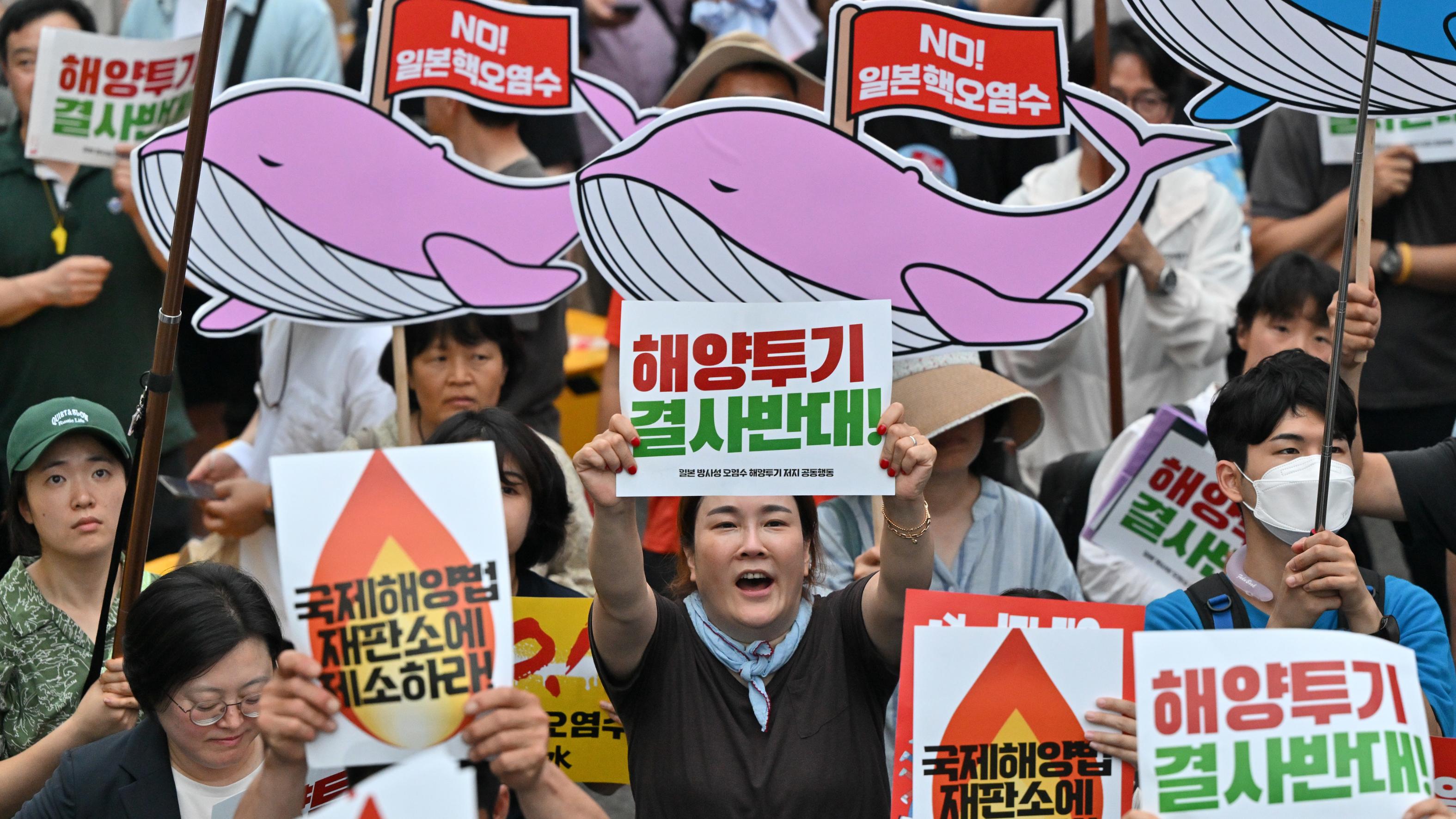Plan to dump toxic water all about money, says Japanese lawyer, amid regionwide protests
 South Korean protesters attend a rally against Japan's plan to discharge treated water from the Fukushima nuclear plant, on a road near the Japanese embassy in Seoul on July 8, 2023. (PHOTO / AFP)
South Korean protesters attend a rally against Japan's plan to discharge treated water from the Fukushima nuclear plant, on a road near the Japanese embassy in Seoul on July 8, 2023. (PHOTO / AFP)
Japan’s plan to release nuclear-contaminated water into the ocean is due to a policy that places economics over and above safety concerns, a Japanese lawyer said.
The Fukushima Daiichi nuclear power plant accident occurred on March 11, 2011, following a massive earthquake and tsunami, despite the Japanese government and the Tokyo Electric Power Company (TEPCO) promoting the facility as “safe”.
Although scientists had warned about the threat of a massive tsunami, both the government and TEPCO — the operator of the power plant — hesitated to invest in safety measures due to cost concerns, and chose to ignore the warnings.
Just like the accident, the current decision to discharge contaminated water from the nuclear power plant into the ocean is the result of a decommissioning policy that prioritizes economic considerations over safety, said Etsuro Totsuka, a Japanese human rights lawyer.
Ocean discharge has been chosen as a solution to deal with nuclear-contaminated water that resulted from debris melting through the containment vessels and mixing with groundwater after the tsunami-triggered meltdown at the facility.
It cannot be compared to the usual operation discharge from nuclear power plants in other countries since the Fukushima water may contain not only tritium but also other radioactive substances, Totsuka said in a written interview with China Daily.
Radioactive materials released from the accident site will remain extremely hazardous over an extended period, necessitating their containment within the nuclear plant site. Yet, the Japanese government chose to release the water into the ocean, opting for a cost-effective decommissioning method.
“Consequently, there is a risk of contaminating the global commons, the open sea, and jeopardizing the safety and health of numerous people worldwide,” Totsuka said.
He noted that alternative methods of treatment were disregarded.
“It seems the government and TEPCO may be afraid that these alternatives would incur higher costs than ocean discharge,” he said.
Once the contaminated water is released into the open sea through Japan’s territorial waters, it becomes uncontrollable and could have unknown consequences on the marine ecosystem and human life, potentially violating the human rights of people worldwide,” he said.
“Even if there are people affected by ingesting radioactive substances accumulated in seafood, it would be impossible to prove whether the damages are caused by radiation from the Fukushima Daiichi nuclear power plant,” Totsuka said.
“Therefore, to prevent such irresponsible outcomes, ocean discharge should not be allowed as long as the safety cannot be proven,” he said.
“If, despite the availability of alternative treatment methods, the government and TEPCO deliberately violate their promises to stakeholders and choose the cheap decommissioning method that may compromise safety, it would be a violation of maritime law,” Totsuka added.
As a signatory to the United Nations Convention on the Law of the Sea, Japan is obligated to comply with its provisions. Article 192 of the Convention says, “States have the obligation to protect and preserve the marine environment.”
Environmentalists, civic groups and fishery organizations across the region are stepping up their campaign against Japan’s plan, which entails dumping more than 1 million metric tons of nuclear-contaminated water into the Pacific Ocean.
In the Philippines, apart from holding protest rallies, advocacy groups are aiming to raise awareness about the dangers of toxic water discharge by organizing in-person gatherings as well as online forums. They are also seeking an audience with the Philippine Department of Foreign Affairs and the Japanese embassy so they can voice their concerns.
Pablo Rosales, the national chairperson of PANGISDA-Pilipinas, a coalition of small-scale fisherfolk in the Philippines, said even if Japan discharges the nuclear-contaminated water only into a certain portion of the ocean, there is high possibility that this will spread out to other bodies of water.
Japan’s planned dumping of nuclear-contaminated water not only threatens the fishing communities’ livelihoods but also national food security, Rosales said.
The Philippines is an archipelago, and fish is a key protein source for most Filipinos.
Japan is planning to discharge wastewater from the Fukushima nuclear power plant into the sea starting in late August or early September, Kyodo News reported on Aug 7.
Community leaders are wary of Japanese claims that the water to be discharged has been treated and considered safe, noting the lack of transparency and data to support the claims.
In South Korea, the leader of the main opposition Democratic Party sent a letter to Japanese Prime Minister Fumio Kishida, urging him to suspend the plan.
Lee Jae-myung, the Democratic Party chief, delivered the letter via the Japanese embassy in Seoul on July 28, calling on Kishida to hold off on releasing nuclear-contaminated water, a party spokesman told a briefing on July 31.
Xinhua contributed to this story.
Contact the reporters at jiangxueqing@chinadaily.com.cn


